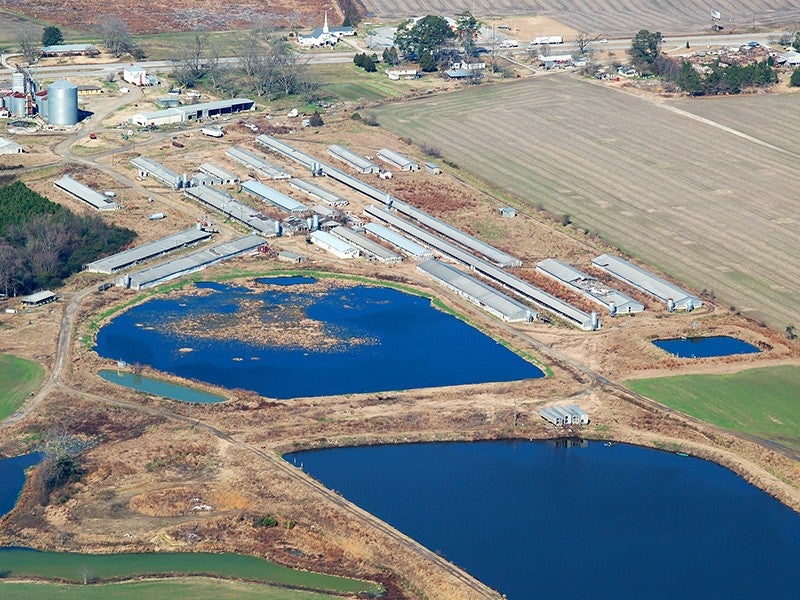Coalition of Groups Submits Comments Urging EPA to Require Industrial Animal Feeding Operations to Report their Dangerous Air Pollution
Requiring animal feeding operations to report their toxic emissions of ammonia and hydrogen sulfide will help community members better protect their health
Contact
Today, a coalition of environmental, animal welfare, and community advocacy groups submitted comments in response to a request from the Environmental Protection Agency (EPA) for input on whether it should require industrial animal feeding operations (AFOs) to comply with the Emergency Planning and Community Right-to-Know Act (EPCRA).
AFOs are nothing like the bucolic farms that commonly appear in advertisements and political statements. Instead, they are industrial facilities that confine hundreds, thousands, or even over a million animals for the production of meat, eggs, and dairy. AFOs generate enormous quantities of urine and feces, and this waste releases large amounts of the extremely dangerous gasses ammonia and hydrogen sulfide. EPA recognizes that exposure to ammonia and hydrogen sulfide from AFOs can cause serious illness and injury to AFO workers and community members, including asthma, scarring of the respiratory tract, headaches, nausea, vomiting, diarrhea, and even death. In addition, EPA admits that AFOs are disproportionately located in environmental justice communities.
Despite the serious harms that AFO air pollution causes, EPA has for nearly two decades exempted AFOs from complying with EPCRA, a law that is meant to ensure that communities have information about hazardous substances in the air they breathe. In response to litigation by the groups signed on to the comments and others, EPA promised to revise or rescind its latest regulation exempting AFOs from EPCRA. But now, EPA has backtracked on this promise and instead asks whether it should require AFOs to comply with EPCRA at all. The comments submitted today urge EPA to ensure that AFOs promptly begin reporting their toxic emissions of ammonia and hydrogen sulfide, as required under EPCRA.
“The predominant U.S. model of animal food production, known as ‘factory farming,’ is fundamentally flawed,” stated Cheryl Ruble, MD, and Craig Volland, co-chairs of a Sierra Club volunteer team committed to addressing the environmental, climate, justice, and public health repercussions of intensive livestock production. “Industrial-scale AFOs confine vast numbers of animals and produce immense amounts of manure, leading to the release of harmful gasses like hydrogen sulfide and ammonia, with serious potential health impacts. Communities have a right to be informed about such hazardous exposures in order to protect their members. Continuing to exempt AFOs from reporting these emissions under EPCRA undermines the EPA’s fundamental mission: ‘to protect human health and the environment.’”
“People have a right to know when an industry is releasing hazardous air pollution that poses serious risks of illness or death near their homes, schools, businesses, and communities,” said Kelly Foster, Senior Attorney for Waterkeeper Alliance. “In direct conflict with its mission to ‘protect human health and the environment,’ EPA is willfully obstructing public access to this vital information by devising actions that illegally allow AFOs to keep hiding their dangerous pollution. They’ve done it for more than a decade and it is well past time for EPA to do its job and revoke the reporting exemption.”
“EPCRA requires facilities to report emissions of extremely hazardous substances, and EPA has unlawfully exempted AFOs from EPCRA reporting for far too long,” said Carrie Apfel, Deputy Managing Attorney at Earthjustice. “Until AFOs come into compliance with EPCRA, rural communities, and AFO workers will continue to lack basic information about hazardous substances in the air they breathe. As a result, they will continue to be impeded in their ability to hold polluters accountable, advocate for stronger health protections, and make informed decisions to protect their health and the health of their family members.”

Additional Resources
About Earthjustice
Earthjustice is the premier nonprofit environmental law organization. We wield the power of law and the strength of partnership to protect people's health, to preserve magnificent places and wildlife, to advance clean energy, and to combat climate change. We are here because the earth needs a good lawyer.